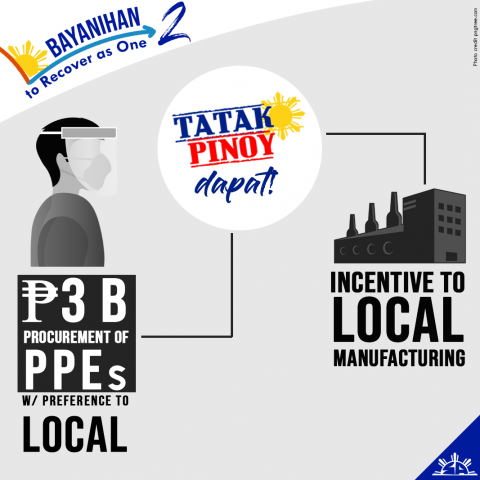
Senator Sonny Angara said today the Bayanihan to Recover as One or Bayanihan 2 contains several provisions aimed at supporting local industries that have been suffering due to the COVID-19 pandemic.
Apart from providing micro, small and medium enterprises (MSME) access to loans through the government financial institutions, Angara said the soon-to-be enacted law gives special preference for locally-manufactured products such as personal protective equipment (PPE) being used by health frontliners across the country.
“In crafting the Bayanihan 2, both the Senate and the House of Representatives made it a point to include Buy Local provisions to give preference to products made in the Philippines. During this critical period, we want to provide as much assistance to our local industries as we could,” said Angara, who as chairman of the Committee on Finance defended the bill in plenary.
“We only had so much funds to work with and so we included these provisions that would ensure that our local industries would be supported without putting any pressure on government finances,” Angara said.
To ensure the adequate and responsive supply of critical products, the government shall give preference and procure products, materials and supplies made in the Philippines.
These include PPEs, surgical equipment and supplies, laboratory equipment and its reagents, medical equipment and devices, alcohol, sanitizers, tissue, hand soap, thermometers, cleaning materials, common medicines, and testing kits.
The DBM-Procurement Service is directed to award to the lowest domestic manufacturer-bidder even if its bid is 15% in excess of the lowest foreign bid.
The winning bidder must secure from the Department of Trade and Industry (DTI) a certification that the articles forming part of its bid are substantially composed of articles, materials or supplies grown, produced or manufactured in the Philippines.
Other qualification and documentary requirements for local manufacturers and suppliers shall be prioritized and expedited by the DOH, FDA and other concerned departments and agencies.
Bayanihan 2 also liberalizes the grant of incentives for the manufacture or importation of critical or needed equipment or supplies or essential goods, including healthcare equipment and supplies.
The Bureau of Internal Revenue is tasked to determine the exemption from fees for the manufacture of these goods.
For the purpose of qualifying for exemption from import duties, taxes and other fees and ensuring supply of PPE at competitive prices, DTI shall certify that the equipment and supplies being imported are not locally available or of insufficient qualify and preference.
Ever since the pandemic hit the country, several local industries have been forced to shift to the production of PPEs to meet the high demand and because the demand for their products have been reduced significantly.
Under Bayanihan 2, the Small Business Corporation is tasked to provide loans to MSMEs for the acquisition of new technologies and systems to adjust business processes for resiliency.
The DTI, through its Negosyo Centers, is also tasked to coordinate the availment of relevant credit and training programs to promote and facilitate domestic supply of critical products.
“For some MSMEs, shifting to the manufacture of goods such as PPEs will not require too much of a change in their operations. For instance, couturiers and shoemakers can just use their existing equipment to produce face masks, gowns and shoe covers. Government will just provide them with financial and technical support as needed,” Angara said.
The DTI is also directed to assist the MSMEs in shifting to e-commerce by providing them with technical support so that they will be able to access a bigger market, especially now when restrictions on movement and mass gatherings are in place to help prevent the spread of the virus.
The national and local government agencies are also encouraged to directly purchase agricultural and fishery products from farmers and fisherfolk and agricultural cooperatives as a form of direct assistance to these sectors. ###
